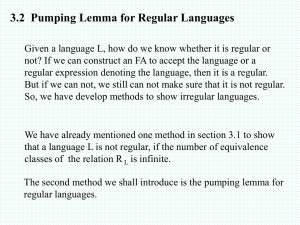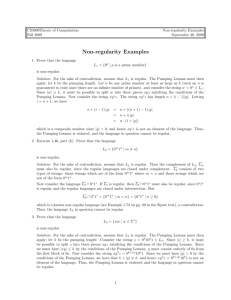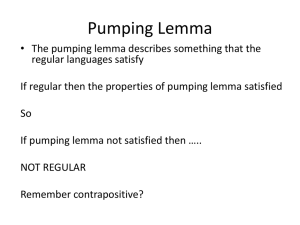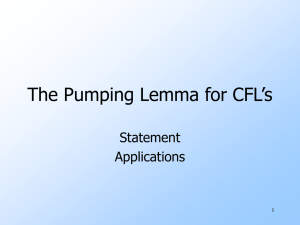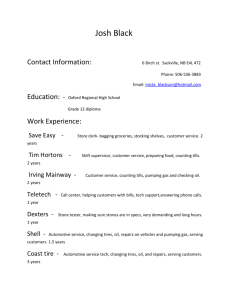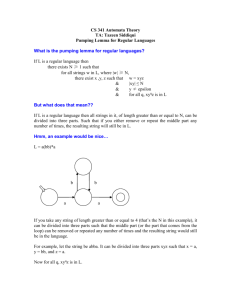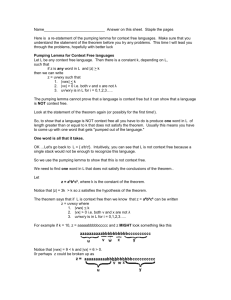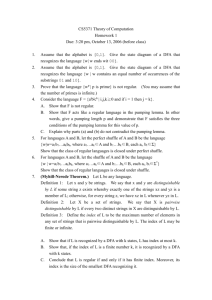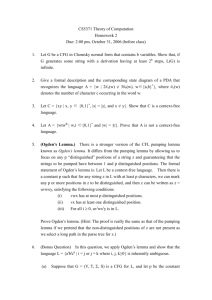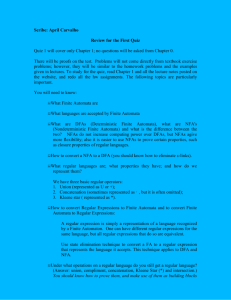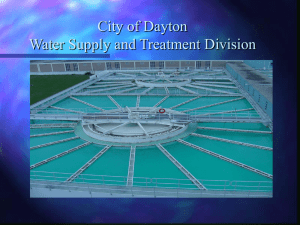The Pumping Lemma
advertisement
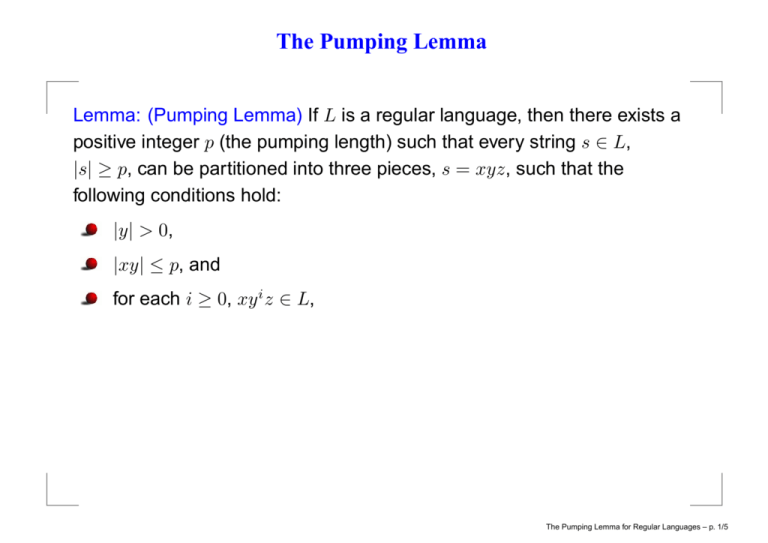
The Pumping Lemma
Lemma: (Pumping Lemma) If L is a regular language, then there exists a
positive integer p (the pumping length) such that every string s ∈ L,
|s| ≥ p, can be partitioned into three pieces, s = xyz, such that the
following conditions hold:
|y| > 0,
|xy| ≤ p, and
for each i ≥ 0, xy i z ∈ L,
The Pumping Lemma for Regular Languages – p. 1/5
Strategy for showing that a language L is not regular
1. Assume that L is regular (with the aim of reaching a contradiction).
2. Choose a string s ∈ L, such that |s| ≥ p where p is the pumping
length given by the pumping lemma.
The pumping lemma then says that s can be partitioned into three
pieces s = xyz where |y| > 0 and |xy| ≤ p, such that xy i z ∈ L for
all i ≥ 0.
3. Show that for ALL POSSIBLE partitions of s = xyz satisfying |y| > 0
/ L.
and |xy| ≤ p there exists an i such that xy i z ∈
If we succeed to show this, then we have a contradiction with the
pumping lemma and our assumption that L is regular is wrong.
The Pumping Lemma for Regular Languages – p. 2/5
The standard example
L = {an bn | n ≥ 0} is not regular.
Proof:
1. Assume that L is regular (with the goal of reaching a contradiction).
2. Choose s = ap bp where p is the pumping length given by the pumping
lemma.
s ∈ L and |s| ≥ p, so the pumping lemma says that s can be
partitioned into three pieces s = xyz where |y| > 0 and |xy| ≤ p,
such that xy i z ∈ L for all i ≥ 0.
3. s = ap bp = xyz where |y| > 0 and |xy| ≤ p implies that for all such
partitions of s, y is a string of a’s of length at least 1. Choose i = 2,
xy 2 z contains more a’s than b’s, thus, xy 2 z ∈
/ L.
This contradicts the pumping lemma, hence, our assumption that
L is regular is wrong and consequently L is not regular.
The Pumping Lemma for Regular Languages – p. 3/5
Primes represented in unary
L = {1n | n is a prime number} is not regular.
Proof: Assume that L is regular. Let p be the pumping length for L given
by the pumping lemma.
Choose s = 1n where n is a prime and n > p + 1. s ∈ L and |s| ≥ p,
hence, s can be partitioned into xyz satisfying the conditions in the
pumping lemma. |xy| ≤ p implies |z| > 1. Since |z| > 1 we have |xz| > 1.
Let i = |xz|, then |xy i z| = |xz| + |y||xz| = (1 + |y|)|xz|. Since both (1 + |y|)
and |xz| are at least 2, their product cannot be a prime. Thus, |xy i z| is not
a prime. Contradiction, the assumption is wrong and L is not regular.
The Pumping Lemma for Regular Languages – p. 4/5
Pumping down
L = {0i 1j | i > j} is not regular.
Proof: Assume that L is regular. Let p be the pumping length for L given
by the pumping lemma. Choose s = 0p+1 1p . s ∈ L and |s| ≥ p, hence, s
can be partitioned into xyz, satisfying the conditions in the pumping
lemma. The condition |xy| ≤ p implies that y consists only of 0’s.
The pumping lemma says that xy i z ∈ L even if i = 0, xy 0 z = xz which
gives xz ∈ L, and since |y| > 0 we know that xz contains fewer 0’s than
xyz = s. Since s only has one more 0 than 1’s, we conclude that xz does
not contain more 0’s than 1’s and xz ∈
/ L.
Contradiction (between xz ∈ L and xz ∈
/ L), the assumption must be
wrong and L is not regular.
The Pumping Lemma for Regular Languages – p. 5/5
